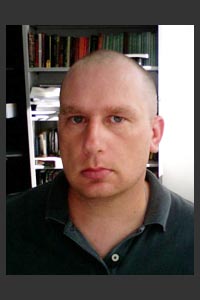

|

|
IN MEMORIAM
Thomas Sizgorich
Associate Professor of History
UC Irvine
1970 – 2011
When Tom Sizgorich died at the age of forty of a stroke on January 27, 2011, the University of California lost a scholar of exceptional talent and the History Department at Irvine lost a remarkable colleague and teacher. If ever there was a person whose education illustrated the wisdom of the designers of the California Master Plan for Higher Education, it was Tom. He earned his BA at California State University at Long Beach, where he majored in journalism. After a stint with the Orange County Register, however, he realized that he was true calling was history. He enrolled at UC Santa Barbara, where he received his Ph.D. in 2005 under the direction of Hal Drake. After teaching at the University of New Mexico, he was recruited to UC Irvine in 2008.
Tom devoted his research to one of the most interesting and thorniest of problems, the interaction of early Islam and Late Antique Christianity. Although many have called for the study of the relationship between these great religious and cultural traditions, few have mastered the formidable language and critical skills necessary for the task. His mastery of Latin, classical Greek, classical Arabic, Coptic and Syriac enabled him to examine documents that are usually considered in isolation from one another. His record of publication was extraordinary for such a brief career. In 2008 he published Violence and Belief in Late Antiquity: Militant Devotion in Christianity and Islam. In this Tom Sizgorich studied the cultural ties that bound the nascent Muslim community to the other confessional communities of Late Antiquity. He argued that these bonds provided both the basis for an ongoing and highly productive “conversation” among these communities as they both used militant asceticism to define themselves and, at the same time, the imaginative material with which to erect highly charged discursive communal boundaries as ascetics invoked fear and violence to curb interaction between their followers and others, and to keep their communities isolated and pure. He also published broadly in the most prestigious journals in the fields of history and Late Antiquity. In these he published some of the preliminary findings of what was to have been his second major research project, an examination of the imperial circumstances under which Islam emerged, and the ways in which Muslims and Christians living within the first Muslim empires imagined, fantasized about and narrated their relationships with each other, their shared imperial pasts and possible imperial futures. It was his goal to encourage a productive exchange between traditionally trained scholars of early Islamic culture and the exponents of postcolonial critique.
Tom was more than a talented researcher and gifted writer; he was an extraordinary teacher and colleague. For some of us, the most memorable lessons in pedagogy we ever received consisted of listening to Tom discuss how he adjusted his teaching to fit the learning styles of students from very different ethnic and socio-economic backgrounds. At once humble, demanding and supportive in the classroom, Tom encountered his students as the individuals they were and sought to draw out the best from each one of them.
His personal qualities as a colleague and friend are perhaps best expressed, in an analogy he would have richly appreciated, by his colleague, Heidi Wolf, of the University of Manitoba, “I surmise that for many of us, we do remember Tom as a kind of saint. I don’t mean one of those benign, prettified, Polyanna types of saints. I refer to the monstrous madmen of the ancient borderlands—stylites, dendrites, desert and tree dwellers, men and women who cut their cloaks in half to give to someone else, and who held the demons at bay for the rest of us, and who called out our hypocrisy and superficiality from the fringes, and who by doing so made a space for us to be more honest and more generous and more magnanimous.”
Tom’s career was brief, but he had an outsized impact on the profession, his students, and his colleagues.
Touraj Daryaee
James Given